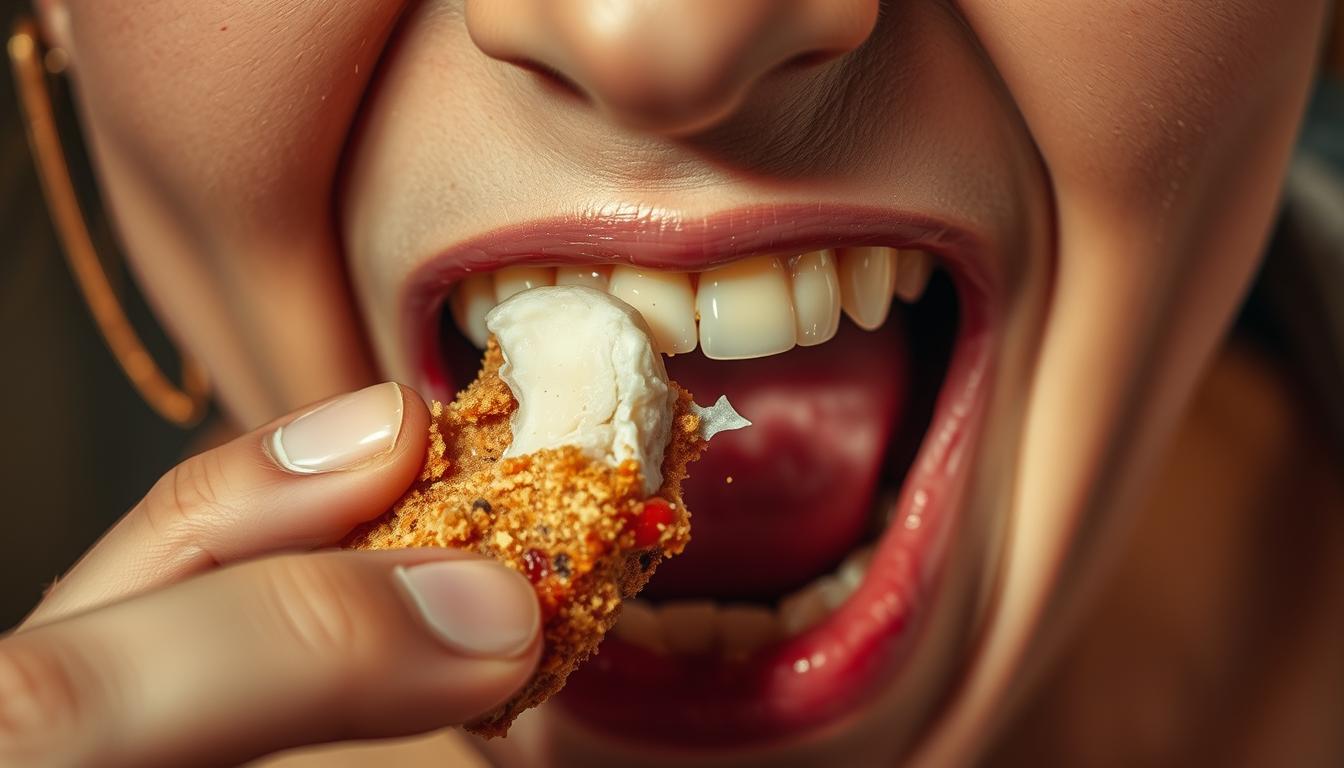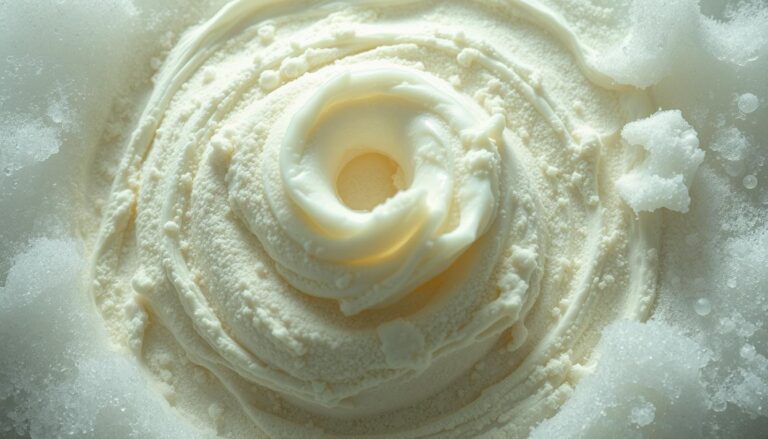Common Ways to Accidentally Break a Tooth

Nearly one third of U.S. adults break a tooth during everyday tasks. Our teeth are protected by tough enamel. Yet, repeated stress or sudden impact can make them vulnerable. Chewing hard foods or opening packages with incisors might seem harmless.
But these actions often lead to tooth breakage. Daily routines can include subtle risks that undermine tooth integrity. Our mission is part of ongoing regenerative medicine research. We aim to help limit fractures and keep teeth intact.
With deeper insight, medical professionals and patients can understand how to prevent breakage. This way, we can preserve healthy smiles.
Key Takeaways
- Even strong enamel may fracture under repeated pressure.
- Hard candies and ice cubes pose a risk for chipped teeth.
- Using teeth as tools increases the chance of unexpected breakage.
- Small cracks often worsen if unchecked or untreated.
- Preventive steps boost long-term dental resilience.
Everyday Activities That Lead to Tooth Damage
Daily routines often seem harmless yet can undermine oral health. Tiny cracks in enamel and stress on delicate structures leave teeth vulnerable. This risk raises questions about how ordinary habits might provoke a tooth injury if overlooked.
Chewing Hard Foods
Ice cubes and rigid candy can weaken teeth. Intense force from biting through hard surfaces may create hairline fractures. Gradual damage builds over time and increases the chance of a painful tooth injury.
Biting Non-Food Items
Pen caps, fingernails, and similar objects wear down enamel. Such items place excessive strain on front teeth. This behavior might develop unconsciously during moments of stress or distraction, resulting in structural compromise.
Grinding Teeth at Night
Bruxism, marked by frequent clenching of upper and lower teeth, strains important dental tissues. Extended grinding affects molars and can lead to chips. Mouthguards or relaxation techniques may help break this cycle.
| Activity | Potential Damage | Prevention |
|---|---|---|
| Chewing Hard Foods | Microcracks and fractures | Opt for softer snacks |
| Biting Non-Food Items | Enamel erosion | Use safe tools or cut items |
| Grinding Teeth | Excessive tooth wear | Wear a mouthguard |
Sports Injuries and Tooth Fractures
Playing sports can put a lot of pressure on your teeth. Hits and bumps can weaken the enamel, making teeth more likely to chip or crack. Wearing protective gear is crucial for anyone in high-impact sports.

Spotting small fractures early can stop bigger problems. Coaches and medical teams work together to check athletes’ teeth. This helps avoid permanent damage and speeds up healing.
Impact from Contact Sports
Playing sports like football or hockey can cause sudden injuries. Athletes who get hit a lot may wear down their enamel over time. This can lead to cracks. Coaches stress the need for dental checks to catch small issues before they get worse.
Inadequate Mouthguard Protection
A mouthguard that doesn’t fit right doesn’t protect well. Skipping custom-made mouthguards can lead to serious injuries. It’s key to check and replace gear often to keep teeth safe.
Dental Health Issues Contributing to Breakage
Underlying dental problems can weaken a tooth’s structure. Small openings in enamel often go unnoticed. Yet, they open the door to bacterial growth that can compromise stability. Once a fracture occurs, discomfort may escalate into a dental emergency if the nerve is exposed or infection sets in.
Cavities and Decay
Cavities begin as tiny spots but can expand without regular checkups. A single cavity allows decay to spread deeper, weakening the core. Fillings and crowns restore compromised sites, reducing the chance of a severe break. Modern solutions like porcelain veneers may conceal cracks while preserving natural tooth appearance.
Weakened Enamel
Certain acids erode enamel over time, paving the way for chips during daily chewing. Even mild pressure, such as biting into soft foods, can cause a sudden break. Early intervention through professional cleaning protects enamel and avoids an unexpected dental emergency. Maintaining robust enamel safeguards against painful fractures and preserves overall oral health.
The Role of Accidental Falls
Accidental falls can harm your teeth more than you think. Sudden slips and impacts can cause teeth to chip. This happens if your teeth are already weak or if the fall hits them at a bad angle.
Small cracks might seem minor at first. But they can let bacteria reach the pulp, which is very sensitive. It’s crucial to get your teeth checked quickly to avoid bigger problems. Dentists often advise being careful during activities and daily tasks that might lead to falls.
Slipping on Wet Surfaces
Wet floors or sidewalks are slippery. A quick slip can lead to mouth-first impacts. Wearing the right shoes and using better flooring can help. Also, watch out for warning signs in public areas.
Falling During Exercise or Play
High-energy activities like running or sports increase the risk of falls. Even if you try to protect yourself, your face is still at risk. Working on your core strength and balance can help prevent chipped teeth.
| Cause | Potential Outcome | Suggested Strategy |
|---|---|---|
| Slippery Gym Floors | Chipped Tooth | Use Protective Mats |
| Outdoor Uneven Ground | Jaw Impact | Practice Stable Footing |
| Running Missteps | Fractured Enamel | Wear Supportive Footwear |
Unintentional Tooth Injury in Children
Young smiles can face sudden mishaps, from small bumps to unexpected collisions. These incidents sometimes lead to a cracked tooth, raising questions about long-term oral health. Prompt care helps guard against complications.
Common Accidents in Young Kids
Gum injuries often occur in playground settings, while bicycles or scooters can cause falls that harm developing teeth. Little ones are still refining coordination, which leaves many vulnerable to chipped edges or serious fractures.
Protective Gear for Kids
Some parents follow recommendations from the American Dental Association and select mouthguards during physical activities. These devices absorb impact and shield delicate enamel from further damage. Helmets and knee pads may reduce the chance of a cracked tooth while children are active.
Advising safe play techniques encourages healthy habits that safeguard dental growth.
Poor Oral Hygiene Effects
Not taking care of your teeth can make them weak. Many people don’t realize how plaque buildup can hurt their teeth. It’s important to brush, floss, and visit the dentist regularly.
Check out useful tips to keep your teeth strong. Cleaning your teeth well helps prevent hidden cracks and protects the enamel. This way, you can avoid bigger problems.
Plaque Buildup and Tooth Weakness
Plaque, a sticky substance, holds bacteria that can damage teeth. When enamel weakens, it can crack easily. Taking good care of your teeth helps prevent this.
- Brush with fluoride toothpaste twice a day.
- Rinse with an antibacterial mouthwash.
- Schedule regular professional cleanings.
Gum Disease and Its Consequences
Gum disease can make gums pull away from teeth. This exposes sensitive parts of the tooth. If your gums bleed or swell, you need to see a dentist fast.
| Risk Factor | Recommended Action |
|---|---|
| Plaque Overgrowth | Frequent brushing with correct technique |
| Weak Gum Support | Speak with a dentist for targeted treatment |
Aging and Tooth Fragility
Years of chewing and gumline changes can weaken teeth. Enamel wear increases dental accident risk and makes care harder. Our focus on regenerative medicine shows the need for special care for older adults to keep teeth strong.
The Impact of Aging on Dental Structure
Enamel gets thinner with age, exposing dentin and increasing fracture risk. Gum recession creates pockets for plaque. Less bone density means teeth are less stable, making early signs important.
Sensitivity or small chips mean it’s time for a dentist visit.
How to Care for Aging Teeth
Regular dental visits catch early problems. Use a soft brush and fluoride products to protect teeth. A diet full of calcium helps keep enamel strong. Here are some tips:
- Get cleanings often to remove plaque
- Use antibacterial mouthwash for extra protection
- Talk about treatments that strengthen teeth
These steps help prevent dental accidents and keep teeth strong as we age.
Stress and Its Impact on Dental Health
High-stress levels can cause physical responses that harm tooth enamel. Some people clench their jaws without realizing it all day. This can lead to tiny cracks in teeth, causing sudden damage if not treated.
Untreated jaw tension often leads people to seek an emergency dentist when pain gets too much.

Clenching Teeth During Stress
Jaws that lock for hours face too much strain. Over time, this can thin out tooth enamel. Molars and incisors become more likely to chip.
Doctors often suggest custom night guards or relaxation techniques to prevent this. These steps can help avoid the need for urgent dental care.
Stress-Related Eating Habits
Some turn to crunchy snacks or sweets for comfort. Foods like dried nuts or candy put a lot of pressure on teeth. Eating these foods too often can cause big cracks in teeth.
Identifying what triggers these habits and choosing softer foods can help avoid such emergencies.
| Stress Factor | Preventive Measure |
|---|---|
| Jaw Clenching | Use protective guards and practice mindful relaxation |
| Stress-Eating | Opt for softer foods and moderate sugar intake |
The Dangers of Certain Medications
Some medicines can harm your teeth by reducing saliva or changing bone density. This makes your enamel thinner and more likely to break. Dry mouth lets acids stay on your teeth longer.
Dentists say it’s important to talk about these side effects before damage happens.

Here are ways to fight dry mouth and protect your teeth:
- Drink more water throughout the day
- Choose sugar-free gum or lozenges
- Consult a dental professional about topical fluoride
Medications That Weaken Teeth
Some drugs can mess with how your body uses calcium. This can hurt the natural repair of your teeth. Treatments for osteoporosis might also affect bone growth, leading to small cracks.
It’s crucial to catch these problems early. If not, small cracks can turn into big, painful issues.
Side Effects Leading to Tooth Damage
Not having enough saliva is a big problem. Without it, bacteria can easily damage your enamel, increasing the risk of cavities. Dry mouth also makes your teeth more sensitive and prone to decay.
Many dentists recommend treatments to help protect your teeth. This way, you can stay ahead of problems and keep your teeth strong.
Home Remedies Gone Wrong
Many people try quick fixes at home to brighten their smile. Some steps might seem safe at first. But, they can really hurt your teeth and gums. It’s important to think carefully before trying any remedy.
Experts say it’s best to talk to a dentist first. They can spot problems you might miss. The wrong approach can lead to hidden dangers.
Using Tools for Teeth Cleaning
Some folks use metal picks or the wrong tools to clean their teeth. These can scratch your enamel, make your gums bleed, or get stuck in tight spots. Here are some things to remember:
- Sharp edges can break your teeth
- Too much pressure can hurt your gums
- Regular dentist visits can catch problems early
DIY Teeth Whitening Kits
Using too much bleach can wear down your teeth. This can make them more sensitive. Talking to a dentist before using at-home whitening kits is a good idea. Many of these products don’t come with clear instructions, leading to unpredictable results.
| Technique | Potential Risk |
|---|---|
| Metal Picks | Enamel Scratches |
| Bleach Strips | Over-Whitening |
| Baking Soda Paste | Gum Irritation |
The Risk of Dental Procedures
Dental treatments can boost oral health but come with risks. Actions like impressions or drilling might put extra pressure on weak teeth. Talking to your dentist and knowing your risks can help keep you safe during treatment.
The American Dental Association suggests talking about worries before and after dental work. Spotting stress points early can prevent tooth breakage and aid in quicker healing.
Inadvertent Damage During Work
Even with care, tools can still harm teeth with decay or thin enamel. Dentists and hygienists use gentle methods, but sometimes chips or cracks happen. Regular dental visits can catch problems early, allowing for gentle fixes before they get worse.
Post-Procedure Care
Following your dentist’s advice is key to keeping your teeth safe and avoiding breaks. Here are some easy steps:
- Eat soft foods when your teeth are healing
- Avoid foods or drinks that are too hot or cold
- Make sure to see your dentist for follow-up visits
| Procedure | Possible Stress | Recommendation |
|---|---|---|
| Filling | Added pressure on weakened enamel | Monitor biting force for a few days |
| Crown Placement | Tight fit around vulnerable areas | Check fit and contact points regularly |
| Root Canal | Risk of micro-fractures | Use a custom-fitted bite guard if recommended |
When to Seek Professional Help
Getting timely care is crucial for your oral health. Dentists across the United States advise watching for early signs. They say to see a trusted professional before the problem gets worse.
Signs of a Broken Tooth
Sharp pain when biting or sensitivity to hot or cold foods can mean a broken tooth. A visible fracture is another sign. These signs often mean you need treatments like crowns or root canals.
Seeing a dentist early can save your tooth and stop pain from getting worse.
Emergency Dental Care Options
Active bleeding, intense swelling, or an exposed nerve need urgent care. Many places have emergency clinics for these situations. They offer quick evaluations, pain relief, and procedures to fix a broken tooth.
Acting fast can prevent infections and help your tooth stay stable.
Seeking help early means you get the best treatments. This approach helps avoid big problems and leads to better results for everyone.


